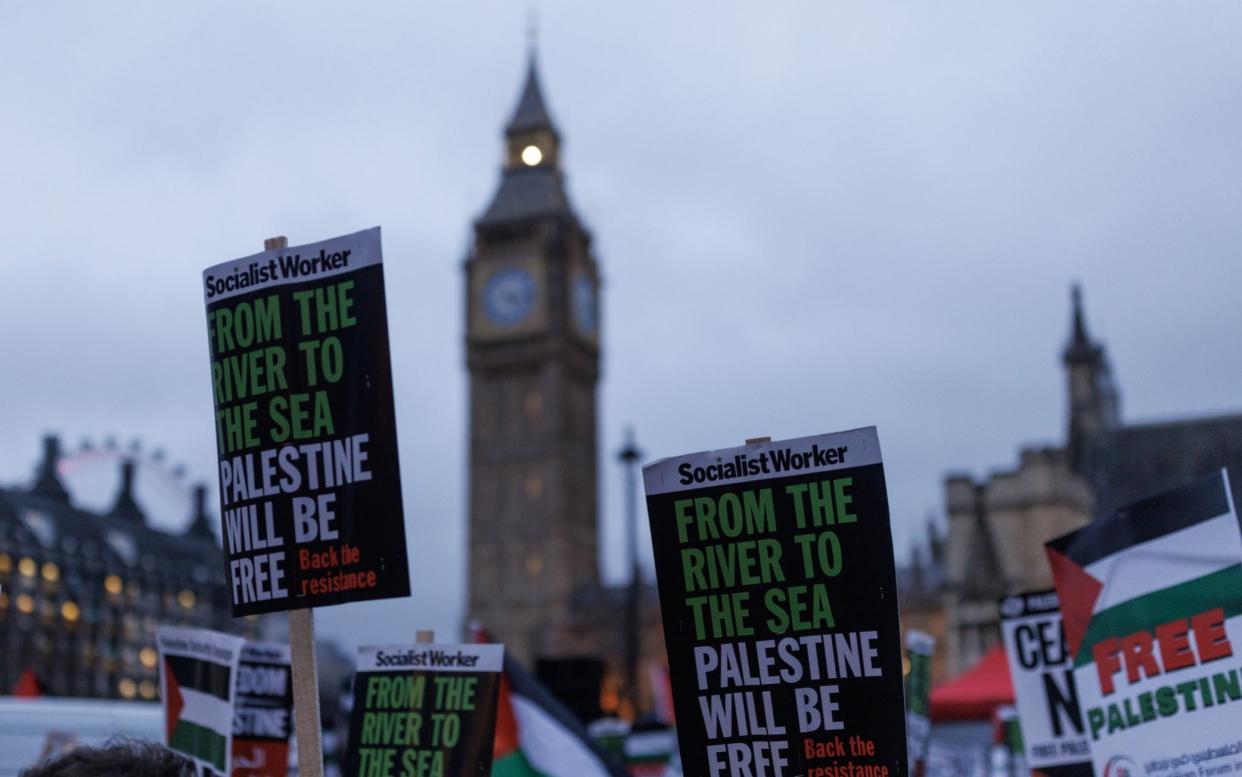Extremist acts have been normalised in Britain. Government must move faster to keep us safe

The Hamas terrorist attacks of October 7 will come to redefine our era. Not since 9/11 have extremist networks been as emboldened.
Anti-Semitism skyrocketing. Inflammatory and borderline criminal rhetoric widely shared on social media. A sense that the terrorism threat is rising. Protests becoming ever more vociferous, with “from the river to the sea” beamed onto the side of Big Ben during a vote on Gaza. MPs more fearful for their safety than ever.
The Prime Minister last week pointed to “a shocking increase in extremist disruption and criminality”. He was right. Now he needs policies that meet the scale of the challenge.
One thing the Government is doing is crafting a new definition of extremism. If the maxim that you cannot defeat what you cannot define is true, then recent history suggests we are in trouble. The Government’s 2011 definition is not used much across Whitehall, but attempts to improve it or put a definition of extremism on the statute books have come to naught.
While debates over a definition can feel like academic navel-gazing when actual extremist acts are so common, the work does have a clear purpose: it will be used to guide future decisions over who government does and does not engage with and fund.
The Government is right to act. Evidence that the state works with or funds extremists has appeared in independent reviews or government strategies dating back over a decade. This needs fixing, new definition of extremism or not.
The focus on an engagement and funding framework is encouraging because it is an example of government looking to make better use of the powers it has: the power of the purse and the ability to bestow legitimacy via engagement.
Future governments may wish to revisit legislative gaps to capture expressions of support for terrorism but, even still, government has more power to tackle extremism than it sometimes thinks. After all, the Iranian government does not have an inalienable right to run schools and mosques in our capital city. It is not an unalterable democratic principle that Hamas and the Muslim Brotherhood must be allowed to run a multitude of charities. We have not betrayed democracy if extremists are no longer able to operate television channels. And we will not have become an authoritarian state if London is no longer permitted to be turned into a no-go zone for Jews every weekend.
All these things and more have become normalised in the UK. It is why I have warned of a permissive environment for radicalisation developing that needs urgently addressing.
Fortunately, last year’s Independent Review of Prevent offers a helpful roadmap for how the Government can do precisely this. Sir William Shawcross’s report still represents the way forward for any government wishing to grip this issue, emphasising that terrorists are driven by ideology, that Prevent had become overly focused on safeguarding, and the need to tackle radicalisers operating below the terrorism threshold. He was particularly ahead of the curve when he identified the blindspot that government had on the UK’s Hamas networks.
Yes, he has expressed some frustration over the pace of implementation and change, including the lack of government guidance for schools targeted by mobs seeking to impose de facto blasphemy laws on the discussion of religious prophets. But I have seen the positive impact his report has already had across government. It is making a difference, including in refreshed training that is now laser-focused on the ideological causes of terrorism. As the extremism threats cascade, it must now double down on Shawcross’s approach.
That means government should move faster, be bolder, and be willing to accept higher legal risk if it means implementing policies that keep us safer. This is particularly pertinent when it comes to disrupting the activities of those groups who propagate extremist narratives but who lurk just below the terrorism threshold. These groups have gone unchallenged for too long and have used their time well. They are now embedded and influential among communities. It cannot only be government that stands up to these extremists – be it Islamist, extreme Right-wing, extreme Left-wing, or other ideological manifestations – but it has the most resources and must take a leading role.
The challenges ahead are immense. The public may be sceptical about whether tough words from the Government will actually result in tough actions. After all, politicians have promised it for decades. Few have delivered. We see the consequences of that failure on the streets daily.
The Government now has an opportunity to break this cycle while also championing the UK’s innate respect for those things that have been in such short supply since 7 October: respect for the rule of law, civility, and decency. It must take it.
Robin Simcox is the Commissioner for Countering Extremism
